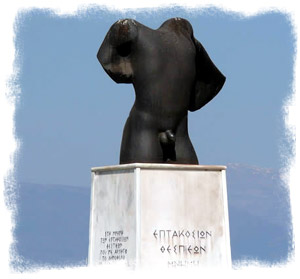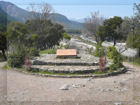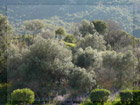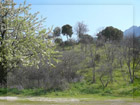
 |
| MAIN |
| Introduction |
| Greek Preparations |
| Armies |
| Battlefield |
| Battle |
| Aftermath |
| Date |
| Monuments |
| COMPLEMENTARY |
| Thermopylae |
| Leonidas I |
| Xerxes I |
| Sparta |
| Thespiae |
| Molon Labe |
| Aftermath |
||||
|
When
the body of Leonidas was recovered by the Persians, Xerxes, in
a rage at the loss of so many of his soldiers, ordered that the head
be cut off and the body crucified. This was very uncommon for the
Persians; they had the habit of treating enemies that fought bravely
against them with great honor, as the example of Pytheas captured
earlier off Skyros shows. However, Xer Xerxes was curious as to why there was such a small Greek force guarding Thermopylae and interrogated some Arcadian prisoners. The answer was that all the other men were participating in the Olympic Games, forbidding them to participate in war. When Xerxes asked what the prize for the winner was, "An olive-wreath" came the answer. Upon hearing this, Tritantaechmes, a Persian general, spontaneously responded by saying to Mardonius: "Good heavens! Mardonius, what kind of men are these against whom you have brought us to fight? Men who do not compete for money, but for honor". Two Spartans survived the conflict. Aristodemus suffered an eye injury and was sent behind the lines, eventually ordered back to Sparta with the retreating allies by the King. Pantites, was sent by Leonidas to raise support in Thessaly but returned to Thermopylae only after the battle's conclusion. Pantites hanged himself in disgrace after being shunned as a "trembler". After the departure and defeat of the Persians, the Greeks collected their dead and buried them on the hill. A stone lion was erected to commemorate Leonidas. Forty years after the battle, Leonidas' body was returned to Sparta where he was buried again with full honors and funeral games were held every year in his memory.
The fierce resistance of the Spartan-led army offered Athens the invaluable time to prepare for a decisive naval battle. The subsequent Greek victory at the Battle of Salamis left much of the Persian navy destroyed and Xerxes was forced to retreat back to Asia, leaving his army in Greece under Mardonius, who was to meet the Greeks in battle one last time. The Spartans assembled at full strength and led a pan-Greek army that defeated the Persians decisively at the Battle of Plataea, ending the Greco-Persian War and with it Persian expansion into Europe. The simultaneous naval Battle of Artemisium was a stalemate, whereupon the Athenian navy retreated. The Persians were now in control of the Aegean Sea and all of peninsular Greece as far south as Attica. The Spartans prepared to defend the Isthmus of Corinth and the Peloponnese, while Xerxes sacked an evacuated city of Athens, whose inhabitants had already fled to Salamis Island. In September, the Greeks defeated the Persians at the naval Battle of Salamis, which led to the rapid retreat of Xerxes. The remaining Persian army, left under the charge of Mardonius, was defeated in the Battle of Plataea by a combined Greek army again led by the Spartans, under the regent Pausanias.
Permission is granted to copy, distribute and/or modify this article under the terms of the GNU Free Documentation License, Version 1.2 or any later version published by the Free Software Foundation.
(What does it mean?)
The text is based on material from the Wikipedia article "Battle of Thermopylae". Modifications, additions to the Wikipedia text and all the photos by the website author. |
 xes was known for his rage,
as when he had the Hellespont whipped because it would not obey
him.
xes was known for his rage,
as when he had the Hellespont whipped because it would not obey
him.



